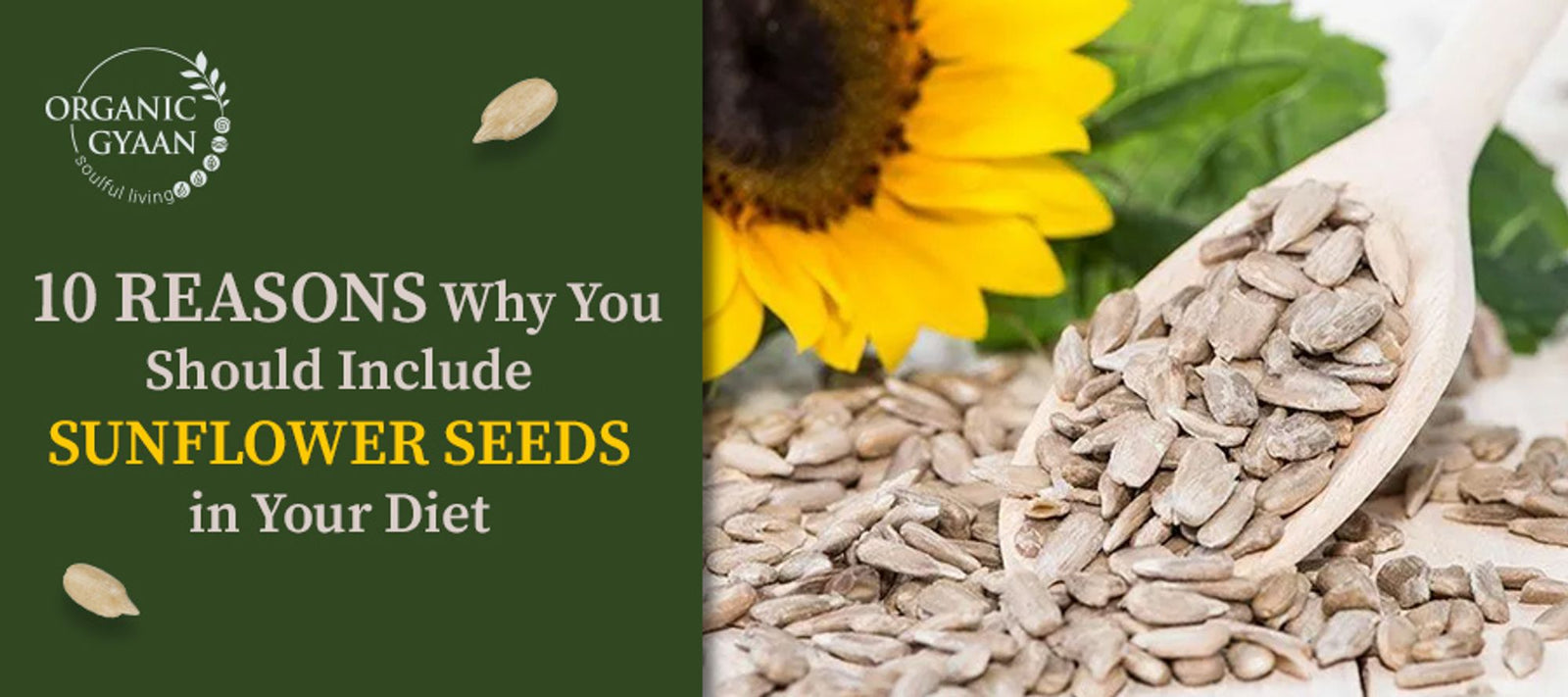Sunflower seeds, the tiny kernels that come from the majestic sunflower plant, are not just a popular snack to munch on during baseball games. They are a powerhouse of nutrition and offer a myriad of health benefits. Rich in essential nutrients and antioxidants, sunflower seeds can be a valuable addition to your diet. Whether sprinkled over a salad, blended into a smoothie, or simply eaten by the handful, these seeds pack a punch of flavor and nutrition. In this blog, we will explore ten compelling reasons why sunflower seeds should be a staple in your pantry.
Nutritional value of Sunflower Seeds
Sunflower seeds are highly nutritious, offering a rich blend of vitamins, minerals, healthy fats, proteins, and fiber. Here's a detailed breakdown of the nutritional value of sunflower seeds, particularly focusing on a 1-ounce (28 grams) serving:
|
Nutrient |
Amount per 1 oz (28g) |
|
Calories |
164 |
|
Protein |
5.5g |
|
Fat |
14g (Healthy fats) |
|
Carbohydrates |
6.5g |
|
Fiber |
3g |
|
Vitamin E |
Over 90% DV |
|
Selenium |
32% DV |
|
Magnesium |
28% DV |
They're rich in antioxidants and offer health benefits like heart health support, inflammation reduction, and may help in weight management due to their protein and fiber content.
Benefits of Sunflower Seeds
1. Rich Source of Nutrients
Sunflower seeds are a treasure trove of vitamins and minerals. They are particularly high in vitamin E, selenium, and magnesium. These nutrients play crucial roles in maintaining good health, supporting everything from your immune system to bone health. The sunflower seeds nutrition profile is so comprehensive that just a small serving can significantly contribute to your daily nutritional requirements.
2. Heart Health Benefits
Incorporating sunflower seeds into your diet can have a positive impact on your heart health. Thanks to their high content of unsaturated fats, particularly linoleic acid (a type of omega-6 fatty acid), these seeds can help lower cholesterol levels and reduce the risk of heart disease. The vitamin E in sunflower seeds also acts as an antioxidant, further protecting the heart by neutralizing free radicals.
3. Supports a Healthy Immune System
Sunflower seeds are good for you, especially when it comes to boosting your immune system. The selenium found in sunflower seeds is known for its immune-enhancing properties. It helps in the production of white blood cells and fights off infections. Additionally, the zinc in these seeds aids in immune response and wound healing.
4. Promotes Healthy Skin
The vitamin E content in sunflower seeds benefits the skin by acting as a powerful antioxidant. It protects the skin from damage caused by ultraviolet light and pollution. Vitamin E also plays a role in skin repair and maintenance, making sunflower seeds a great food for a glowing complexion.
5. May Help Control Blood Sugar
For those managing diabetes or looking to stabilize their blood sugar levels, sunflower seeds can be a nutritious snack option. The fiber in sunflower kernels helps slow down glucose absorption into the bloodstream, aiding in blood sugar regulation.
6. Supports Weight Management
Despite their high calorie count, sunflower seeds can be a beneficial addition to a weight management plan. The fiber and protein in sunflower seeds help in making you feel full for longer, reducing overall calorie intake. Just be mindful of portion sizes to keep the sunflower seeds calories in check.
7. Enhances Brain Function
The essential fatty acids, vitamins, and minerals in sunflower seeds play a role in improving brain health. These nutrients support cognitive function, memory, and mood. Regular consumption of sunflower seeds may contribute to a lower risk of developing neurodegenerative diseases.
8. Boosts Energy Levels
The magnesium in sunflower seeds helps convert food into energy, contributing to reducing fatigue and boosting your energy levels. Additionally, the seeds' B vitamins are crucial for energy metabolism.
9. Promotes Digestive Health
Fiber is essential for healthy digestion, and sunflower seeds are a good source of dietary fiber. Including them in your diet can help promote regular bowel movements and prevent constipation.
10. Anti-inflammatory Properties
Chronic inflammation is a root cause of many diseases. The antioxidants and compounds found in sunflower seeds have anti-inflammatory effects that can help reduce inflammation and the risk of chronic health conditions.
Conclusion
In summary, sunflower seeds are a nutritional powerhouse filled with benefits that can significantly enhance your health. From supporting heart health to boosting your immune system, these tiny kernels are packed with vitamins, minerals, and antioxidants. By simply incorporating sunflower seeds into your diet, you can enjoy their numerous health benefits in a tasty and convenient way. So, don't overlook the humble sunflower seed; it's a small addition that can make a big difference to your overall well-being. Start adding our sunflower seeds to your meals and snacks today and step towards a healthier you.





















